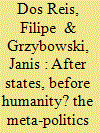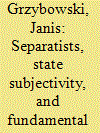|
|
|
Sort Order |
|
|
|
Items / Page
|
|
|
|
|
|
|
| Srl | Item |
| 1 |
ID:
190292


|
|
|
|
|
| Summary/Abstract |
The international’ is the background condition that holds together inquiries of international politics, orders, systems, societies, practices, and so forth. Albeit being usually taken for granted, its foundational function begs the questions of what the international actually is or, instead, what conceptualisations of the international imply, project, and do. Periodic discussions in International Relations (IR) about the international as the subject matter of the field routinely revolve around attempts to fix its definition, to consciously escape it, or to return to a pragmatic approach of using rather than questioning the concept of the international. In bringing the international from the background to the fore, this Special Section investigates explicit and implicit conceptualisations of the international, and their implications. It does so in a variety of ways and areas. The special section focuses on dynamics of reification and reflection, on how the ‘international’ is opposed to the ‘transnational’ or ‘the world’, how it is denied or seemingly superseded, and how it yet retains its conceptual significance.
|
|
|
|
|
|
|
|
|
|
|
|
|
|
|
|
| 2 |
ID:
193484


|
|
|
|
|
| Summary/Abstract |
In the debate on the (de-)judicialisation of international affairs and the International Criminal Court (ICC) specifically, the distinctions between legality and politics and between state sovereignty and the international remain contested. While realist and legalist approaches discuss the transformation of international politics by international criminal law, sociological and critical-legal perspectives instead highlight the politics of international criminal law. In this contribution, we focus on how the distinctions between (international) law and politics matter, not as substantively opposed spheres, but as boundaries that the ICC itself contingently and flexibly draws when considering particular situations. These meta-politics of invoking and reproducing key boundaries in seemingly technical elaborations of the interest of justice, the scope of its jurisdiction, or the application of complementarity reflect the Court’s particular authority but also its predicament of pushing for an international criminal law serving humanity, rather than states, while reproducing the distinctions between (international) law and politics. We illustrate the Court’s meta-politics by revisiting three recent decisions of the ICC to (not) investigate alleged international crimes committed by British forces in Iraq, by the Taliban, governmental, and US forces in Afghanistan, and by Israeli authorities and Palestinian groups in the West Bank, East Jerusalem, and Gaza.
|
|
|
|
|
|
|
|
|
|
|
|
|
|
|
|
| 3 |
ID:
183222


|
|
|
|
|
| Summary/Abstract |
At the height of the Syrian civil war, many observers argued that the Syrian state was collapsing, fragmenting, or dissolving. Yet, it never actually vanished. Revisiting the rising challenges to the Syrian state since 2011 – from internal collapse through external fragmentation to its looming dissolution by the ‘Islamic State’ – provides a rare opportunity to investigate the re-enactment of both statehood and international order in crisis. Indeed, what distinguishes the challenges posed to Syria, and Iraq, from others in the region and beyond is that their potential dissolution was regarded as a threat not merely to a – despised – dictatorial regime, or a particular state, but to the state-based international order itself. Regimes fall and states ‘collapse’ internally or are replaced by new states, but the international order is fundamentally questioned only where the territorially delineated state form is contested by an alternative. The article argues that the Syrian state survived not simply due to its legal sovereignty or foreign regime support, but also because states that backed the rebellion, fearing the vanishing of the Syrian nation-state in a transnational jihadist ‘caliphate’, came to prefer its persistence under Assad. The re-enactment of states and of the international order are thus ultimately linked.
|
|
|
|
|
|
|
|
|
|
|
|
|
|
|
|
| 4 |
ID:
187379


|
|
|
|
|
| Summary/Abstract |
Ontological security studies (OSS) in International Relations (IR) emphasize the role of identity, anxiety, and a sense of self in world politics. Yet suggesting that states act in certain ways because of ‘who they are’ also assumes that they are in fact states. In this article, I problematize the presupposition of state subjects in the context of separatist conflicts in which claims to statehood compete and overlap. Where unrecognized de facto states are pitted against their unyielding parent states, the two threaten each other’s very state personhood, thereby presenting a more radical challenge to their existence than traditional ‘physical’ and ‘ontological’ security threats. Separatist conflicts thus reveal a widely overlooked dimension of fundamental ontological security, provided by the constitution and recognition of states as such. Moreover, because of the exclusiveness of state subjects in the modern international order, any third parties attempting to resolve such conflicts inevitably face a meta-security dilemma whereby reassuring one side by confirming its claim to statehood simultaneously renders the other side radically insecure. Thus, rather than regarding particular state subjects as merely the starting point of quests for ontological security in international relations, they should also be understood as already their result.
|
|
|
|
|
|
|
|
|
|
|
|
|
|
|
|
|
|
|
|
|